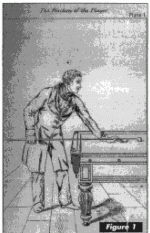This is an interesting thread that has an interesting mix of ideas. My take is this:
While pool is not an overly physical game, the ability to play high level pool requires excellent hand eye coordination, an ability to repeat your stroke the same way over and over, and an ability to adjust your feel for different shots and tables. I would suggest that pro players have these abilities at a level that the normal person will never realize. Because of this ability, as long as they put the time in, they can hone many types of strokes and make them effective...a la Bustamante vs Hopkins vs McCready. Because of this, emulating their stroke may be reaching for something that the average person can not attain because of their lack of the abilities stated above. I think the average person will thus benefit from learning some basic fundamentals relating to stance, grip, stroke etc., leaving enough room for differences related to comfort, body type and your physical make up. I think instructors who have not played at a pro level, but have committed great amounts of time to the game, but themselves are unable to perform it at a pro level, can be very beneficial in accomplishing this for most students at many levels. They can also help with progressions into pattern play, spin, knowledge of throw, banking etc as one progresses.
That being said, I love watching the pros play and watching their patterns, strokes, ball speed etc, and feel I have learned a lot from doing that. I can remember watching Corey Deuel play Efren and picking up the simple fact of how effortless they cued, and how little power they used. That stuck with me, and my game progressed immediately that day, and has progressed at many times from watching them and emulating other things.
Their is something to be said for experience when trying to teach something. I played college baseball, and can tell you that the game was taught at another level every step I went up. I learned a lot more having played college ball than I knew after high school. Their is also something to be said for actually facing 90-95mph fastballs, and then teaching someone how to hit them, vs teaching it without ever doing so. However, I do think you can reach a level where the knowledge of the game becomes similar, and those better equipped with the tools needed to succeed move on, and the others now play once a week softball. I'm sure the vast majority of major leaguers possess more baseball knowledge than me, but just because my arm strength, bat speed, and running ability doesn't match theirs, doesn't mean I could not effectively teach the game (although I wold certainly listen to Derek Jeter tell someone how to play shortstop over me).
Pros have an ability, knowledge, and experience level related to the game that should be well respected, and carries great value to someone that wants to improve. They can likely teach certain things that the average person will never be able to teach. However, their are many people that can play the game at a level and have an understanding of the game combined with an ability to teach that can make them very effective tools for the average person to utilize in improving their game.
I guess i am making a few points here.
1. You have to be able to experience, thus play the game at a certain level to to be able to teach it.
2. Some people can overcome fundamental deficits due to their superior tools for the game. Those people probably won't be great teachers of the average student, unless they recognize that, even if they are pros.
3. Some people may be able to do something well, but not relate how to do it to another person.
I see value in both sides of the coin. I watch as much pool as I can for both the enjoyment of it, and to learn about the game. I have also taken instructions from non-pros that I felt did a lot to help my game.

